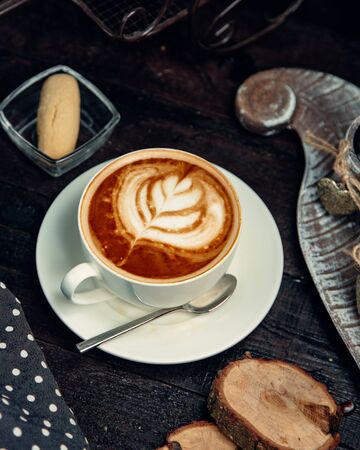Coffee’s First Arrival on British Shores
Step back to the bustling streets of 17th-century London, where a curious new aroma began wafting from the city’s lively ports. Coffee, an exotic import from the Ottoman Empire, arrived in the UK through maritime trade routes, particularly via the River Thames, which served as London’s gateway to the world. Its debut was met with intrigue and mild suspicion—at first regarded as a medicinal tonic by apothecaries and adventurous souls alike. The very first coffee house is believed to have opened near St Michael’s Alley in Cornhill around 1652, quickly drawing in merchants, writers, and thinkers eager for stimulating conversation over this novel beverage. As word spread and coffee houses multiplied, these “penny universities” became hubs of spirited debate and social exchange, shaping not only London’s emerging café culture but also echoing outward into towns across England. Coffee’s arrival signalled more than just a change in beverage preference—it marked the dawn of a new social ritual that would evolve with British society itself.
2. The Rise—and Fall—of the Coffeehouse
If you wander down the winding streets of London today, it’s easy to spot the ubiquitous modern coffee chains and indie roasters that pepper the city. But step back in time to the 17th and 18th centuries, and you’ll find yourself in the midst of a true golden age—the British coffeehouse era. These establishments were far more than simple places to sip a hot brew; they were vibrant social and political hubs that left an indelible mark on British culture.
The Birth of the Coffeehouse Culture
Coffee first made its way into England in the mid-1600s, quickly capturing the imagination of Londoners. Coffeehouses sprang up seemingly overnight, catering to a clientele eager for lively conversation and intellectual stimulation. Unlike the exclusive gentlemen’s clubs or rowdy taverns, coffeehouses were open to all men—regardless of class—who could afford a penny for admission.
Social & Political Influence
The British coffeehouse became known as “penny universities” for good reason. Within their timbered walls, merchants struck business deals, writers exchanged ideas, and political debates flourished. It wasn’t uncommon to rub shoulders with luminaries such as Samuel Pepys or Isaac Newton over a cup of strong black coffee. The following table illustrates some key features of these historic venues:
| Coffeehouse Feature | Description |
|---|---|
| Clientele | Open to all men (varied social classes) |
| Main Activities | Debates, news sharing, business dealings |
| Reputation | “Penny universities” for their stimulating discussions |
| Famous Patrons | Writers, scientists, politicians |
The Shift Towards Tea
Despite their initial popularity, coffeehouses began to lose their edge by the late 18th century. The British palate gradually shifted towards tea—a change influenced by trade with China and India and promoted heavily by the monarchy and upper classes. Tea became synonymous with refinement and comfort, while coffeehouses faced increasing regulation and suspicion from authorities wary of dissent.
This decline paved the way for tea rooms and pubs to take centre stage in British social life. Yet, the legacy of the early coffeehouses lingers on—echoes of their vibrant debates and community spirit can still be felt in Britain’s modern café culture.
![]()
3. British Coffee Traditions Through the Decades
If you trace the British relationship with coffee, it’s a journey shaped by history, class, and a dash of eccentricity. In the Victorian era, coffee was largely the preserve of London’s coffee houses – lively social hubs that set the stage for political debate, literary gatherings, and business deals. While tea eventually overshadowed coffee in popularity, these establishments left an indelible mark on how Britons socialised over a hot drink.
By the early twentieth century, coffee drinking in the UK had become more domestic. Instant coffee made its debut during World War II, providing a quick pick-me-up for soldiers and civilians alike. This convenience-driven approach continued post-war, as “a cup of instant” became a staple in British homes – a far cry from the espresso-fuelled rituals found on the continent.
The 1950s and 60s saw the rise of the “coffee bar” culture, especially among youth in cities like London and Liverpool. With Formica tables, jukeboxes, and frothy coffees served in glass cups, these venues became icons of cool – offering a distinctly British twist on café society. Unlike their Italian or French counterparts, British coffee bars were often places to listen to music, meet friends after work or school, and enjoy novelty drinks like “frothy coffee” (the beloved cappuccino’s local cousin).
What truly sets UK coffee apart is this quirky blend of practicality and sociability. Where continental Europe might revere the art of espresso or café culture as a daily ritual, Britain’s approach has always been more relaxed: think mugs rather than demitasse cups, and conversation over ceremony. The British affection for “a cuppa,” whether tea or coffee, is about warmth and welcome – an invitation to pause and connect.
As we moved into the late twentieth century and beyond, global influences began to seep into the high street with American-style coffee chains. Yet beneath this veneer of frappuccinos and lattes lies a uniquely British tradition: unpretentious, ever-evolving, and rooted in community spirit.
4. The Third Wave: Artistry and Specialty Coffee
The third wave coffee movement has swept across the UK in recent years, transforming the way Britons experience their daily brew. Unlike the instant or mass-market filter coffees of the past, this new era is defined by an artisanal approach—where every cup tells a story from bean to barista. Independent roasters are at the heart of this revolution, often tucked away in converted railway arches or bustling city corners, championing small-batch roasting and traceable sourcing. These pioneers pride themselves on building direct relationships with coffee farmers around the world, ensuring both exceptional quality and ethical practices.
Independent Roasters: The Local Heroes
Across cities like London, Manchester, and Edinburgh, independent roasters have become cultural landmarks. Their focus on transparency and flavour profiling is elevating coffee into a true craft. You’ll find single-origin beans roasted to highlight unique tasting notes—think floral Ethiopian Yirgacheffe or chocolatey Guatemalan Antigua. These roasteries often invite locals for open cupping sessions, blending education with community spirit.
Barista Culture: A New Breed of Craftspeople
The barista’s role has evolved far beyond simply pulling espresso shots. Today’s UK baristas are trained in everything from latte art to precise water chemistry, reflecting a dedication to mastery reminiscent of Britain’s top chefs or mixologists. Cafés now double as creative studios where presentation matters as much as taste. This meticulous attention to detail has given rise to competitions like the UK Barista Championships, which further fuel innovation and pride within the scene.
Sustainability and Sourcing: Conscious Consumption
Modern British coffee culture is also deeply intertwined with sustainability—a value that resonates strongly with both industry insiders and everyday drinkers. Many cafés operate with a zero-waste philosophy, offer plant-based milks, and use compostable cups. Sourcing practices are scrutinised to ensure fair trade and minimal environmental impact, aligning with broader movements towards ethical consumption.
Key Elements of the Third Wave Coffee Movement in the UK
| Aspect | Description |
|---|---|
| Independent Roasters | Focus on small-batch production, single-origin beans, and direct trade relationships. |
| Barista Culture | Emphasis on skill, creativity, and customer engagement through education and competitions. |
| Sustainability | Commitment to ethical sourcing, waste reduction, and environmentally friendly practices. |
A Taste of Modern Britain
This artisanal revival has not only elevated coffee standards but also redefined how communities connect—be it through neighbourhood pop-up tastings or local festivals celebrating the humble bean. For those seeking both flavour and purpose in their cup, the UKs third wave coffee scene offers a journey steeped in craftsmanship, conscience, and unmistakable British flair.
5. Local Coffee Events Lighting Up the Scene
The United Kingdom’s coffee renaissance is not just happening behind café counters or within artisan roasteries; it’s bubbling over into streets, markets, and historic halls through a vibrant calendar of local coffee events. These gatherings, from lively regional festivals to intimate pop-up tastings, have become the beating heart of Britain’s modern coffee culture, offering both aficionados and casual drinkers a taste of community spirit brewed with a distinctly British flair.
Coffee Festivals: Regional Flavour in Every Cup
Across the UK, cities like London, Edinburgh, Manchester, and Bristol each host their own signature coffee festivals. These aren’t just trade shows—they’re full-blown celebrations where independent roasters rub shoulders with home baristas, workshops demystify the science of the perfect espresso, and live music mingles with the aroma of freshly ground beans. The London Coffee Festival, for example, transforms the Old Truman Brewery into an immersive playground for all things caffeinated, while Glasgow Coffee Festival puts Scotland’s thriving specialty scene centre stage.
Pop-Ups & Micro-Events: Bringing Coffee to Unexpected Places
The UK’s love affair with pop-ups has spilled over into the coffee world. Whether it’s a mobile espresso bar at a farmers’ market in Somerset or a temporary brew bar inside a disused railway arch in Leeds, these fleeting events bring quality coffee to new corners and communities. They often feature guest roasters and limited-edition blends—perfect for those who seek novelty and adventure in every cup.
Community Gatherings: More Than Just a Brew
At the grassroots level, community-focused happenings are energising local neighbourhoods. From “coffee crawl” tours that champion independent cafés to charity cupping sessions supporting social causes, these events foster conversation and connection over shared tables. In many villages and towns, local coffee mornings have evolved into regular meet-ups—equal parts social club and tasting session—where stories are swapped as freely as brewing tips.
Together, these dynamic events have transformed coffee from a solitary morning ritual into a powerful catalyst for togetherness across the UK. Whether you’re sipping your way through a bustling festival or discovering a hidden gem at a Sunday market pop-up, Britain’s contemporary coffee scene offers endless opportunities to come together—and share in something truly special.
6. Looking Ahead: Britain’s Brewing Future
The story of coffee in the UK is far from over. As we reflect on its rich heritage and the dynamic revival seen through local events, it’s clear that innovation remains at the heart of Britain’s coffee culture. Today, the future looks brighter than ever, fuelled by a growing appreciation for quality, provenance, and sustainability.
Emerging Trends and Innovations
From eco-conscious sourcing to experimental brewing techniques, British cafés are embracing new ideas with open arms. The rise of plant-based milks, single-origin beans, and zero-waste initiatives are shaping how both high street giants and boutique independents serve their customers. Baristas are increasingly celebrated as artisans, often showcasing their skills at regional competitions and pop-up tastings.
The Role of Local Events
Local coffee festivals, community tastings, and educational workshops have become crucial touchpoints in this ongoing evolution. These events not only introduce the public to the nuances of specialty coffee but also foster a sense of connection between roasters, café owners, and enthusiasts. They offer a space for sharing stories, discovering new flavours, and supporting local businesses.
A Vision for Tomorrow
Looking ahead, Britain’s brewing future seems set to blend tradition with progress. While established chains continue to adapt to changing tastes with innovative menus and sustainable practices, independent cafés are pushing boundaries with creative collaborations and unique spaces that double as cultural hubs. The journey from historic coffee houses to today’s vibrant scene suggests that British coffee culture will keep evolving—one cup at a time—always reflecting the tastes and values of its people.


